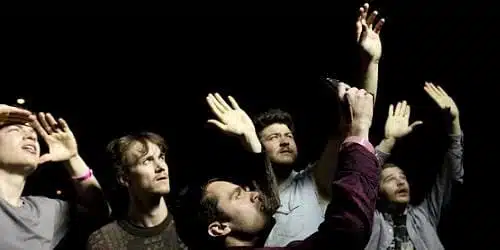
The Felice Brothers have been at the game for quite a while, and in the most classic fashion: they are a family band, one which got its start busking for change in the NYC Subway system.
That makes the brothers Felice–Ian and James, along with a crew of co-musicians–more salt of the earth than the brothers Gallagher, able to claim more street cred than the brothers Gibb, and just more than those bros in Kings of Leon. James Felice (vocals and anything with keys) speaks with the warmth and confidence of a musician doing what he loves most. On his band’s newest record, Celebration, Florida, he and the group push past their Americana roots and into new territory. This exploration didn’t come purely by chance. As James puts it, “With this record, we came to the table with the intention to make the record that we did . . . previous records were a little more haphazard, just trying things out. We knew almost exactly how we wanted the record to sound, how we wanted the record to feel.”
The result: a looser, more freewheeling album that showcases the band’s eclectic chops without losing any of the compositional strengths of its past material. “It was dangerous, in a way”, James says, “because we came to the table with all of these songs that weren’t really finished.” Celebration is much more of a full-band affair, with each member contributing live to the construction of the songs, rather than simply playing to the Felices’ solidified ideas. “It was more pressure, but it was also more fun . . . we spent so much time basically sitting in a circle with our instruments, fleshing out these songs.” This level of experimentation holds particular sway in the world of Americana or roots rock, where bands often build an initial reputation by mastering classic folk songs or traditional ballads, rather than pushing the boundaries of the genre’s musical ingredients.
“Back in the Dancehalls”, for example, trades Appalachian strings for programmed beats and minimalist keyboards. James explains: “We’ve never felt beholden to any genre, and the records we made in the past–we were never trying to make a certain kind of record . . . We all started out doing that–playing other people’s songs–but there’s a time to stop doing that”, he says, laughing. As for the electronic elements, he says, “We bought a drum machine and just learned how to use it [from scratch], and when we were writing songs, we would lay down a scratch drum track, take the drums out, and put it a digital drum track–or vice versa–or sometimes we’d build the track from the ground up with the drums and bass.” This instrumentation adds a texture to Celebration absent from the band’s past material–one of a few different sounds with which the Felice Brothers experiment here.
Tracks like “Fire in the Pageant” and “Honda Civic”, for instance, see the band trading lilting folk melodies for some real grit–the rawness of the vocals in “Pageant” calls to mind Tom Waits or Modest Mouse’s Isaac Brock, and that quality brings an edge to the song. James says many of those raw moments “were mistakes, or things we could’ve smoothed out”, but that the band decided to keep its messier takes in order to secure a less polished, live-in-studio sound. And the group feels more comfortable in the studio now, in general: “We’ve been in the studio long enough now to know how to use it, and to start to enjoy hearing your own sound and your own voice”, he says.
James mentions such studio wizards as Radiohead and Stevie Wonder as primary influences around Celebration‘s recording. That blend of contemporary and classic instrumentation bleeds into the lyrics on the album, as well, with the Felices writing narratives that sound less distant than in the past, less concerned with period pieces and more with the present. “Our earlier stuff”, James says, “was often grounded in more of a mythological setting. This new record–we were reading a lot Don DeLillo and Thomas Pynchon and watching David Lynch films–so we were interested in telling stories that could relate to today.” Other non-musical artforms crop up as reference points on Celebration–Orson Welles in Ponzi and Oliver Stone in a song named after him–and James says, “Film is a huge part of our lives . . . growing up, I remember seeing The Godfather at 16, and it changed my life forever, the quality of the storytelling. Lynch, Tarkovsky, Bergman . . . in the studio, with a song, you want to be able to close your eyes and see something there, and that’s cinema, too.”
On the other hand, the Felice Brothers don’t entirely reject the traditions from which their music was born. “You can’t not listen to Mississippi John Hurt or Skip James and not feel something”, he says. “That music touches us.” Wherever James and the Felice Brothers lay their sights, they seem to take something away for storage, for an idea in a song-to-be. They’re likely well on their way toward their next step.

